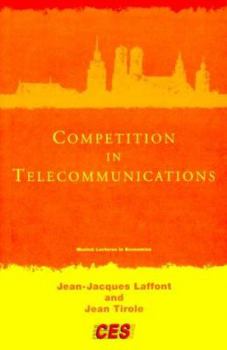Competition in Telecommunications (Munich Lectures)
Select Format
Select Condition 
Book Overview
Theoretical models based on the assumption that telecommunications is a natural monopoly no longer reflect reality. As a result, policymakers often lack the guidance of economic theorists. Competition in Telecommunications is written in a style accessible to managers, consultants, government officials, and others. Jean-Jacques Laffont and Jean Tirole analyze regulatory reform and the emergence of competition in network industries using the state-of-the-art theoretical tools of industrial organization, political economy, and the economics of incentives. The book opens with background information for the reader who is unfamiliar with current issues in the telecommunications industry. The following sections focus on four central aspects of the recent deregulatory movement: the introduction of incentive regulation; one-way access (access given by a local network to the providers of complementary segments, such as long-distance or information services); the special nature of competition in an industry requiring two-way access (whereby competing networks depend on the mutual termination of calls); and universal service, in particular the two leading contenders for the competitively neutral provision of universal service: the use of engineering models to compute subsidies and the design of universal service auctions. The book concludes with a discussion of the Internet and regulatory institutions. Copublished with the Center for Economic Studies and the Ifo Institute
Format:Hardcover
Language:English
ISBN:0262122235
ISBN13:9780262122238
Release Date:December 1999
Publisher:MIT Press
Length:336 Pages
Weight:1.50 lbs.
Dimensions:1.1" x 6.3" x 9.3"
Customer Reviews
2 ratings
Review of Competition in Telecommunications
Published by Thriftbooks.com User , 18 years ago
Probably the best summary of the economics of access regulation in the easly chapters that you'll find anywhere (particularly after the sad passing of Jean-Jacques) and a very accessible coverage of the application of those principles to the specific case of telecommunications.
Network Competition in Practice
Published by Thriftbooks.com User , 24 years ago
Professor Laffont's book illustrates the last ten years theoretical developments that explain how feasible is to encourage competition in local telephony.As usual, theoretical developments follows technological advances that allow profitable entry in a typical natural monopoly market. Moreover, this book highlights the importance for policy makers in helping entry in this market by eliminating legal entry barriers, or in some cases subsiding new becomers.Although this book is more oriented to policy makers than academics, I would like to have seeing more formal treatment for some of the many topics cover by professor Laffont. Nevertheless, this book represents an excellent summary of network competition literature.






